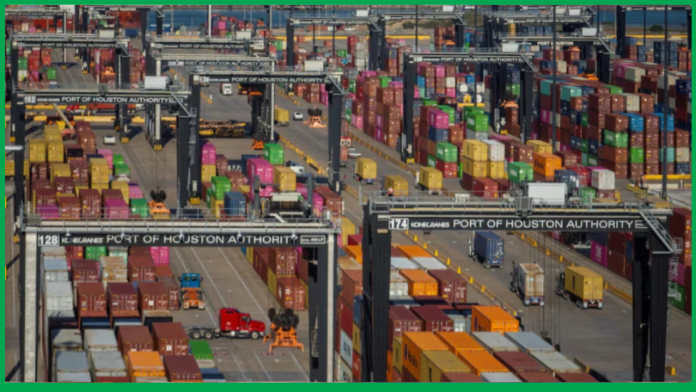President Donald Trump’s “reciprocal” tariffs on several countries went into effect on Wednesday, including a massive 104% duty on Chinese imports, intensifying his global trade war just as he prepared for negotiations with various nations.
These aggressive tariffs have disrupted the longstanding global trade order, raised concerns about a potential recession, and caused significant drops in global stock markets.
Since Trump announced the tariffs a week ago, the S&P 500 has lost nearly $6 trillion in value, marking its biggest four-day loss since its inception in the 1950s. The index is edging closer to a bear market, defined as a 20% drop from its most recent high.
In Asia, the sell-off resumed on Wednesday after a short break, with Japan’s Nikkei falling over 3% and South Korea’s won dropping to a 16-year low. U.S. stock futures also indicated a fifth consecutive day of losses on Wall Street.
Trump has given investors mixed signals about whether the tariffs will be permanent, calling them “permanent” while also claiming they are pressuring other nations into negotiations. “We have a lot of countries coming in that want to make deals,” he said, adding that he expects China to seek an agreement as well.
The U.S. has scheduled talks with South Korea and Japan, two key allies, and Italian Prime Minister Giorgia Meloni is expected to visit next week. The deputy prime minister of Vietnam, hit with some of the highest tariffs, is also scheduled to meet with Treasury Secretary Scott Bessent later on Wednesday.
Stock markets had initially risen on Tuesday due to hopes for potential deals, but U.S. stocks lost those gains by the end of the day.
Trump nearly doubled tariffs on Chinese goods, which had been set at 54%, following Beijing’s counter-tariffs. China has vowed to resist what it considers economic coercion. Major Chinese brokerages have pledged to work together to stabilize the domestic stock market in response to the tariff-induced volatility.
Economists warn that U.S. consumers may face higher prices on everyday items, from sneakers to wine, due to the ongoing trade war. While the full impact of Wednesday’s tariffs may not be felt immediately, goods already in transit before midnight will be exempt if they arrive by May 27.
A new Reuters/Ipsos poll found that nearly three-quarters of Americans expect everyday prices to rise in the next six months.
Trump’s previous 10% tariffs on all imports from several countries began on Saturday. The latest round of tariffs, effective from 12:01 a.m. ET (0401 GMT), targets countries that Trump claims are “ripping off” the U.S., including the European Union, which faces a 20% tariff.
Trump has framed these tariffs as retaliation against barriers to U.S. goods and has accused countries like Japan of manipulating their currencies to gain a trade edge, a claim Japan denies. Japan’s finance minister stated that trade talks with Washington could also address foreign exchange rates.
Trump has indicated that his tariff actions may not be over. He mentioned to Republican lawmakers on Tuesday evening that he would soon announce “major” tariffs on pharmaceutical imports, one of the few product categories exempt from the new duties.


